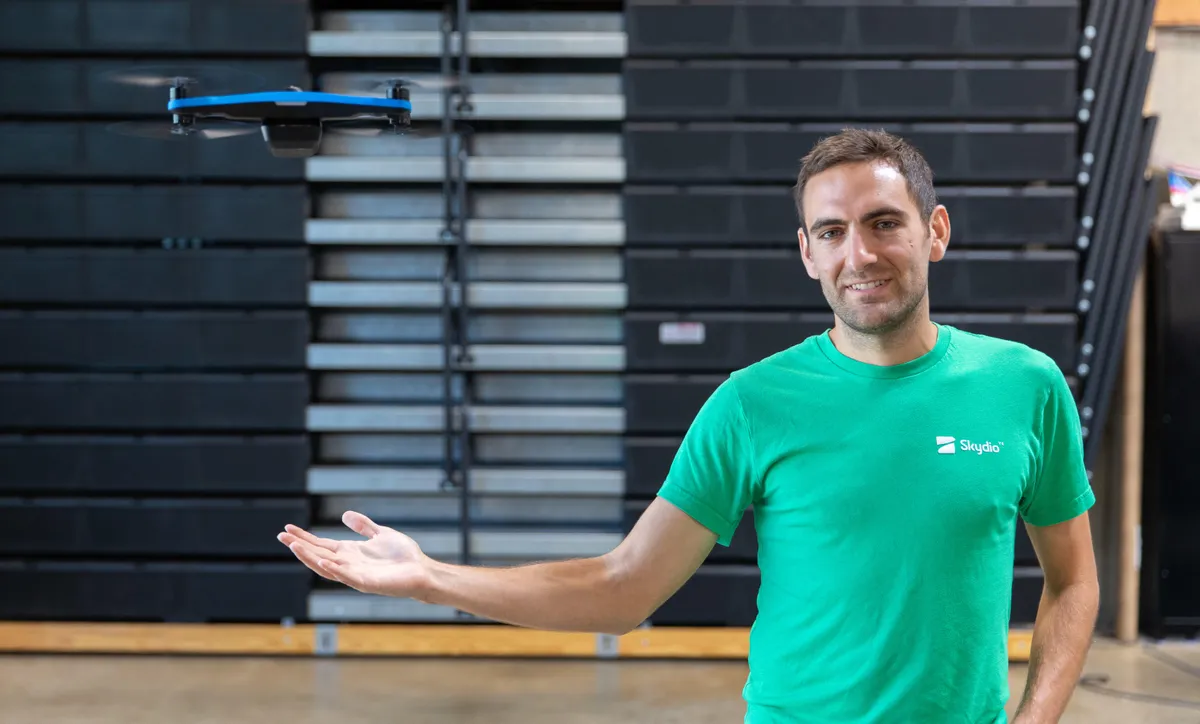10 Most Prestigious Aviation & Aerospace Solution Companies To Watch In 2023


Title: Skydio: Redefining Autonomy in the Aviation & Aerospace Industry In the rapidly evolving world of aviation and aerospace, autonomy is becoming a game-changer. Autonomous systems are revolutionizing industries, from aerial surveying to search and rescue operations, with the potential to increase efficiency, reduce costs, and enhance safety. Leading the charge in this autonomous revolution is Skydio, a trailblazing company founded by visionary CEO Adam Bry. In this article, we'll explore Skydio's remarkable journey, their pioneering technologies, and the insights of CEO Adam Bry, who is reshaping the future of aviation and aerospace. Skydio's Genesis: A Vision of Autonomy Skydio, headquartered in Redwood City, California, emerged in 2014 with a compelling vision – to make autonomous flight accessible and practical for a wide range of applications. This vision was brought to life by the company's co-founders, Adam Bry, Abe Bachrach, and Matt Donahoe. Skydio's journey began with a focus on developing autonomous drones that could navigate complex environments with a level of skill and intelligence previously unseen. A Leader with a Vision: Adam Bry At the helm of Skydio is CEO Adam Bry, an influential figure in the field of autonomy and robotics. Adam Bry holds a Master's degree in Aeronautics and Astronautics from the Massachusetts Institute of Technology (MIT), where his passion for autonomous systems was ignited. Bry's background at MIT's renowned Computer Science and Artificial Intelligence Laboratory (CSAIL) laid the foundation for his groundbreaking work in autonomous flight. Before co-founding Skydio, Adam Bry had already gained recognition for his contributions to the field of autonomous systems. His prior experience includes being a part of the winning team at the 2007 DARPA Urban Challenge, which focused on autonomous ground vehicles. This early success demonstrated his dedication to pushing the boundaries of autonomy in transportation. The Skydio Autonomy Platform: Game-Changing Technology Skydio's primary focus has been on developing advanced drone technologies and autonomy systems, specifically designed to enable unmanned aircraft to operate autonomously in complex, GPS-denied environments. At the core of their capabilities is the Skydio Autonomy Platform, a set of hardware and software that equips drones with unparalleled intelligence and awareness. The key components of the Skydio Autonomy Platform include: Computer Vision: Skydio's drones are equipped with multiple cameras and sensors, which enable them to create detailed 3D maps of their surroundings. This information is continually processed, allowing the drone to navigate through challenging environments with precision. Obstacle Avoidance: Skydio's drones are renowned for their exceptional obstacle avoidance capabilities. They can expertly avoid obstacles, from trees to buildings, in real-time, ensuring safe and reliable flight. Object Tracking: One of Skydio's standout features is its ability to autonomously track a subject or object, maintaining visual contact and ensuring high-quality video capture for applications like aerial filming and inspections. Autonomous Navigation: The Skydio Autonomy Platform enables autonomous flight planning and navigation. The drone can create its flight path and dynamically adapt to changes in the environment. AI-Powered Control: Skydio's autonomous systems leverage artificial intelligence (AI) to make real-time decisions, ensuring safe and precise flight. These components, combined with cutting-edge hardware, make Skydio's drones an ideal choice for a wide range of applications, from cinematography to public safety and industrial inspections. Applications and Use Cases Skydio's innovative technology has found application across various industries. Some of the notable use cases for Skydio's autonomous drones include: Public Safety: Skydio drones are used by first responders and law enforcement agencies for search and rescue missions, accident investigations, and incident monitoring. Their autonomous capabilities are invaluable in scenarios where immediate response is crucial. Aerial Filmmaking: The film and entertainment industry has embraced Skydio drones for capturing breathtaking aerial footage. Their ability to autonomously track subjects in challenging environments provides filmmakers with new creative possibilities. Industrial Inspections: Industries such as construction, infrastructure, and energy benefit from Skydio's drones for inspecting hard-to-reach or hazardous areas, saving time and improving safety. Mapping and Surveying: Skydio drones are utilized for creating 3D maps and conducting topographic surveys, allowing professionals in various fields to gather data efficiently. To gain a deeper understanding of Skydio's journey and vision, we had the privilege of interviewing CEO Adam Bry. In this exclusive conversation, Bry shared his thoughts on the role of autonomy in the aviation and aerospace industry, Skydio's mission, and the challenges the company has overcome. Interviewer (I): Adam, you've been at the forefront of autonomy and robotics for years. What inspired you to co-found Skydio and focus on autonomous drones? Adam Bry (AB): Thank you for having me. My passion for autonomy began during my time at MIT and later, as part of the team that won the DARPA Urban Challenge. That experience showed me the incredible potential of autonomous systems to transform various industries. When we co-founded Skydio, we wanted to apply those principles to the world of aviation. Drones, with their versatility and accessibility, presented an ideal platform for autonomy. Our goal was to create drones that could navigate complex environments independently, opening up a wide range of applications. I: Skydio's technology is known for its exceptional obstacle avoidance and autonomous navigation. Can you tell us more about the challenges you faced in developing these capabilities? AB: Developing obstacle avoidance and autonomous navigation capabilities was indeed a significant challenge. Navigating complex environments in real-time is demanding, especially when GPS is unavailable. We had to leverage cutting-edge computer vision and AI technologies to make it happen. It took years of research, development, and testing to achieve the level of autonomy our drones have today. It's a testament to the dedication and expertise of our team. I: Skydio has found applications in a variety of industries. Can you share a use case that particularly stands out to you? AB: One of the use cases that stands out is the deployment of our drones by first responders and public safety agencies. Our technology is helping save lives in critical situations. For instance, our drones have been used in search and rescue missions, providing responders with vital situational awareness and reducing the time it takes to locate missing individuals. It's incredibly rewarding to see our technology making a positive impact in these scenarios. I: What do you see as the future of autonomy in aviation and aerospace, and how does Skydio fit into that future? AB: The future of aviation and aerospace is undeniably autonomous. Autonomy holds the potential to make operations safer, more efficient, and more accessible across a wide range of applications. As for Skydio, we're committed to continuing to push the boundaries of what's possible with autonomous flight. We see our technology being used in more industries and enabling new use cases. Our mission is to make autonomous systems accessible to a broader audience, and we believe that the future will see a wide range of applications and industries benefiting from the technology we're developing. Skydio operates in a competitive landscape within the drone and autonomy industry. Several other companies are also working on advancing drone technology, autonomy, and related applications. The challenges that Skydio faces include: Regulations and Compliance: Navigating the regulatory landscape for drones can be complex, especially as more drones take to the skies. Adhering to regulations while developing advanced autonomy capabilities is an ongoing challenge. Market Expansion: As the drone market continues to grow, Skydio faces the challenge of expanding its reach and staying ahead of the competition. International Competition: The drone industry is global, and competition comes from companies around the world. Skydio must remain innovative and competitive on an international scale. Security Concerns: The use of autonomous drones raises security and privacy concerns that must be addressed to ensure public acceptance and compliance with regulations. Skydio, led by CEO Adam Bry, has become a prominent player in the field of autonomy and aerospace. Their groundbreaking technology has transformed the capabilities of drones, making them safer and more versatile in complex environments. The company's focus on applications across various industries, from public safety to cinematography, demonstrates the wide-reaching impact of autonomy in aviation and aerospace. As Skydio continues to advance its technology and expand its presence in the industry, it remains at the forefront of the autonomy revolution. Their commitment to pushing the boundaries of what autonomous systems can achieve is shaping the future of aviation and aerospace, making the skies safer and more accessible for all.
CEO Insights: An Interview with Adam Bry






